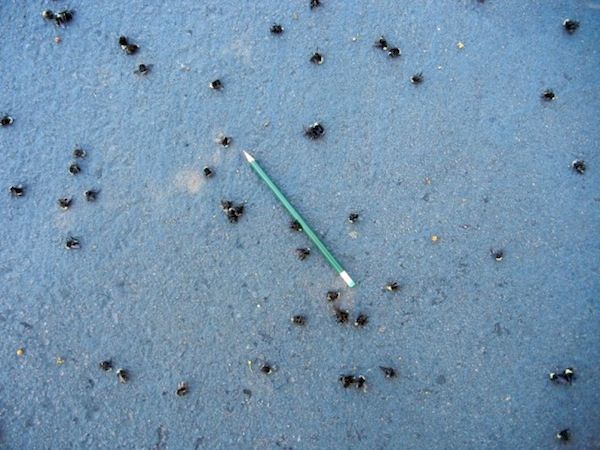General Discussion
Related: Editorials & Other Articles, Issue Forums, Alliance Forums, Region ForumsMore on the massive 40-50,000 bee deaths in Oregon (and some questions)
Last edited Sat Jun 22, 2013, 02:17 PM - Edit history (1)
DUer Factsarenotfair reminded me on an earlier thread of the problems with rogue wheat in Oregon and the proximity of
We serve farmers in the seven county north valley area and focus our research and education on the region's most important crop systems: nurseries and greenhouses, fresh vegetables and specialty seed crops, berries and small fruit, Christmas trees, and small commercial farms. In addition, NWREC is the location for the state's only IR-4 Pesticide Registration program working with agricultural crops throughout Oregon.
http://oregonstate.edu/dept/NWREC/
http://www.democraticunderground.com/10023052201
Dan Hilburn, director of plant programs at the state Agriculture Department, surveyed the damage after an earlier assessment from pesticide experts.
"I've never encountered anything quite like it in 30 years in the business," he said Wednesday outside the Argyle Square Target.
Hilburn said initial findings indicate the trees were sprayed Saturday with an insecticide called Safari. Tests to confirm what killed the bees will take at least two or three days, department officials said. The department of agriculture is also investigating other possible culprits, which may include other pesticides used in the surrounding area.
Safari is part of the neonicotinoid pesticide family. When it is sprayed on a plant, the leaves, flowers and nectar become toxic to almost all insects. The product's label on the distributor's website warns it is "highly toxic" to bees and tells applicators not to apply it "if bees are visiting the area."
http://www.oregonlive.com/environment/index.ssf/2013/06/25000_bubblebees_killed_droppi.html#/0
http://www.businessweek.com/articles/2013-06-20/the-search-for-monsantos-rogue-gmo-wheat

Why does the scenario of events make me suspicious? Is Factsarenotfair on to something? Did they spray for rogue wheat in the vicinity of these bees? Because that product that killed them sure as hell sounds like one of Monsantos. Of course, Monsato is after weeds using these neonicotinoid products which they claim don't kill bees, not insecticide per se. Well, here's 40 to 50,000 dead bees. Killed by the same ingredient Monsanto's Round-Up Ready poison uses in their GMO Frankenseeds for pest control. Am I right to see this bee kill as significant proof that Monsanto's products cause massive bee death?
edit: I only posted the story because I had read the earlier one about rogue Monsanto wheat having been found in the same vicinity. The bee kill and the rogue wheat do not appear connected other than geographically and by the shared ingredient in their products. It is the neonicotinoid product connection I am curious about. Whether in insecticide or pesticide, it appears to be deadly to bees.
Dickster
(104 posts)Safari is manufactured by Valent Corporation, not Monsanto. It is an insecticide, not a herbicide. I seriously doubt that it's use would have anything to do with the rogue wheat fields you mentioned, more likely used to control some other pest in another crop. I'm not a Monsanto defender, but your premise that they are involved here is pretty far fetched and a knee jerk reaction without any factual basis. As far a using neonicitoids, which Safari is, it needs to be taken off the market until we know more about how it effects bees.
Generic Other
(28,979 posts)I have no idea what is being sprayed where or how much. Apparently Safari is dangerous to bees. It has the same active ingredient as Round-up. That is why I see it as connected to Monsanto.
Sorry, I didn't make myself clear at all.
Also, I only posted the story because I had read the earlier one about rogue Monsanto wheat having been found in the same vicinity. The bee kill and the rogue wheat do not appear connected other than geographically and by the shared ingredient in their products.
The sad thing is that someone wiped out the entire area's bee colonies.
Anyway, thanks for asking me to clarify my statement.
Blanks
(4,835 posts)I haven't spoken to him in years, but my mom told me that all of his bees died off a few years ago.
Apparently he had been at it for a few years and was devastated by the loss.